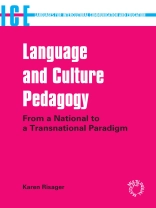How can we envisage a new language and culture pedagogy that breaks with the tradition of viewing language as part of a closed national universe of culture, history, people and mentality, and begins to see itself as a field operating in a complex and dynamic world characterised by transnational flows of people, commodities and ideas? Initially, to understand the field and its current challenges, we must understand its history, and the first part of this book contains a critical analysis of the history of the international field of culture teaching – the first historical treatment of this field ever written. The next part of the book focuses on how we can build a framework for a new transnational language and culture pedagogy that aims at the education of world citizens whose intercultural competence includes critical multilingual and multicultural awareness in a global perspective.
Spis treści
1. Modern Language Studies: Language, Culture, Nation
2. Culture Pedagogy until the 1960s
3. Culture Pedagogy in the 1970s – Knowledge of Society
4. Culture Pedagogy in the 1980s – The Marriage of Language and Culture
5. Culture Pedagogy in the 1990s – Internationalisation and the Intercultural
6. Culture Pedagogy Today – Questioning of the National Paradigm
7. Language and Culture: The Structure of the Complexity
8. Towards a Transnational Language and Culture Pedagogy
9. The Intercultural Competence of the World Citizen
References
Subject Index
Name Index
O autorze
Karen Risager is Professor Emerita in Cultural Encounters, Roskilde University, Denmark. Her research field is language and intercultural education from a transnational and global perspective. She has published widely, including Representations of the World in Language Textbooks (Multilingual Matters, 2018).












